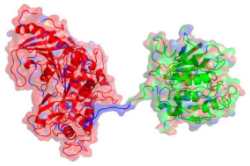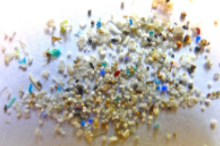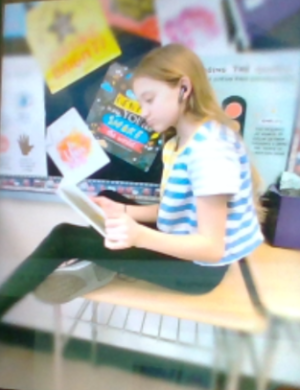Hungry For Plastics

January 19, 2022
Plastic is NOT biodegradable, as many years of studies have discovered. However, something that is similar to biodegration is happening — at a VERY miniscule scale. Who are the superheroes eating the destructive plastics? A couple of enzymes.
The Enzymes
First of all, what is an enzyme? An enzyme is a natural catalyst that is almost always a protein. An enzyme will hasten the pace of specific chemical reactions. Enzymes all share a catalystic property — they don’t get destroyed during the reaction.
One of the enzymes that break down the plastic is produced by a certain type of bacteria called Ideonella Sakaiensis. Ideonella Sakaiensis ‘feeds’ on plastic bottles. According to the website Science Focus, “Professor John McGeehan, director of the Centre for Enzyme Innovation  (CEI) at the University of Portsmouth, said that unlike natural degradation, which can take hundreds of years, the super-enzyme is able to convert the plastic back to its original materials, or building blocks, in just a few days. ‘Currently, we get those building blocks from fossil resources such as oil and gas, which is really unsustainable,’ he said. ‘But if we can add enzymes to the waste plastic, we can start to break it down in a matter of days.’” What Professor John McGeehan is saying is that the super-enzyme converts the plastic back to its original form, before being plastic. It converts back into the more natural, eco-friendly materials it was produced from.
(CEI) at the University of Portsmouth, said that unlike natural degradation, which can take hundreds of years, the super-enzyme is able to convert the plastic back to its original materials, or building blocks, in just a few days. ‘Currently, we get those building blocks from fossil resources such as oil and gas, which is really unsustainable,’ he said. ‘But if we can add enzymes to the waste plastic, we can start to break it down in a matter of days.’” What Professor John McGeehan is saying is that the super-enzyme converts the plastic back to its original form, before being plastic. It converts back into the more natural, eco-friendly materials it was produced from.
A Helpful Mutation
Idonella Sakaiensis was already breaking down plastics, an impressive feat, but too slowly. Therefore, after the discovery of the bacteria, scientists were exploring a way to make these enzymes work faster. Then, one day, Professor McGeehan discovered that if you bioengineer one of the enzymes, PETase (the PET stands for polyethylene terephthalate), could reduce the plastic back to its original components in a mere matter of days. Prof. McGeehan and his team mixed together PETase with another, different, enzyme, which led to a shocking discovery. According to the team’s study published in the Proceedings of the National Academy of Sciences, “‘the digestion of the plastic bottles nearly doubled.”’
Later in the lab, the team decided to connect the two enzymes with genetic engineering —what they said was like connecting two PAC-men with a string. What McGeehan found was that the enzymes together worked around six times faster than the original PETase enzyme. Professor McGeehan said, “This is quite a significant leap forward because the plastic that ends up in our oceans today is going to take hundreds of years to break down naturally.” What he means is that this breakthrough will help deplete plastic levels in the ocean, much faster than it will naturally. When plastics break down naturally, they end up as microplastics that harm the environment.
Destroying Plastics
The tests show that the enzymes can break down a plastic known as PET, which is commonly used in food packaging and soft drink containers. And even though PET is usually recyclable, the PET that’s left as garbage still persists in the environment for hundreds of years before breaking down. Along with destroying the PET, the enzymes also destroy PEF (polyethylene furanoate), which is commonly found in beer bottles. And even though Professor McGeehan said that the enzyme is unable to break down other types of plastics, this is still a huge scientific breakthrough.
This is huge because there are microplastics everywhere. Without even knowing it, you breathe in and eat microplastics — they’re so tiny you don’t even recognize that they’re present. Because the PETs that aren’t recycled end up as microplastics, you are breathing them in and eating them. That’s like eating a plastic bottle! In fact, microplastics are dangerous to our health. If we can destroy PETs before they reach the microplastic state, we could be saving ourselves and all the other organisms in the environment.
As next steps, the team is working on trying to speed up the breakdown process so that the enzymes can be used commercially and at larger scales.
Evolution at Work
You may have heard the word ‘evolution’ before. Evolution is a theory. The theory of evolution was first ‘created’ by Charles Darwin. He said that each species adapts so that it can live the best it can in a given environment. For example, he said that a bird would adapt so that it has a beak that forages for berries, if the habitat the bird lived in had a lot of berries.

Since the 1940s and the 1950s, plastics were being mass-produced. The plastics got left in the garbage, and made their way into our world’s oceans. Soon, microplastics became part of the environment. The species that lived in the ocean had to go through some adaptation, otherwise they wouldn’t survive. As it is, dozens of animals die each day because of pollution in the oceans. But soon, evolution took place and, voila! The enzyme-producing, plastic-consuming bacteria came into existence. Now other animals (us) are using the enzymes that the bacteria produces to help undo what we did. So basically, we’re trying to fix the mess that we made, and other animals have actually gotten to fixing the problem faster than we could.
All in all, this discovery that was made by Professor McGeehan was incredible and will change the lives of millions of organisms. If we can reduce the amount of microplastics in the oceans and on our Earth, there will be a better tomorrow for the entire global community. As long as we continue to discover and keep on exploring, we will have a very bright and hopeful future.
Works Cited
Ayala, Francisco Jose. “Evolution | Definition, History, Types, & Examples (summary).” Encyclopedia Britannica, www.britannica.com/science/evolution-scientific-theory. Accessed 15 Dec. 2021.
Genome.Gov. “Enzyme.” Genome.Gov, www.genome.gov/genetics-glossary/Enzyme. Accessed 15 Dec. 2021.
Magazine, Smithsonian. “Engineered ‘Super Enzyme’ Breaks Down Plastic.” Smithsonian Magazine, 1 Oct. 2020, www.smithsonianmag.com/smart-news/engineered-super-enzyme-breaks-down-plastic-180975949.
Rigby, Sara, and P. Science. “Super-Enzyme Breaks Down Plastic Bottles in ‘a Matter of Days.’” BBC Science Focus Magazine, 29 Sept. 2020, www.sciencefocus.com/news/super-enzyme-breaks-down-plastic-bottles-in-a-matter-of-days.
Yale. “New Super-Enzyme Can Break Down Plastic at Rapid Pace.” Yale E360, e360.yale.edu/digest/new-super-enzyme-can-break-down-plastic-at-rapid-pace#:%7E:text=The%202018%20work%20had%20determined,version%20worked%2020%20percent%20faster. Accessed 15 Dec. 2021.




